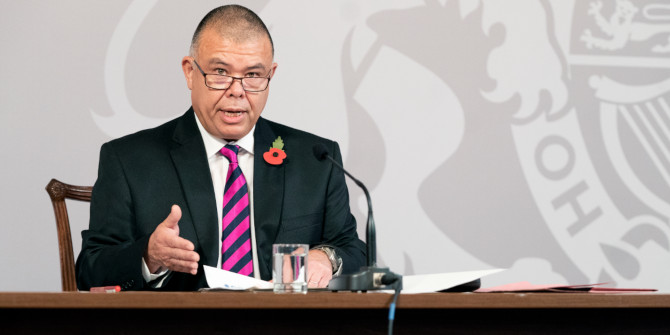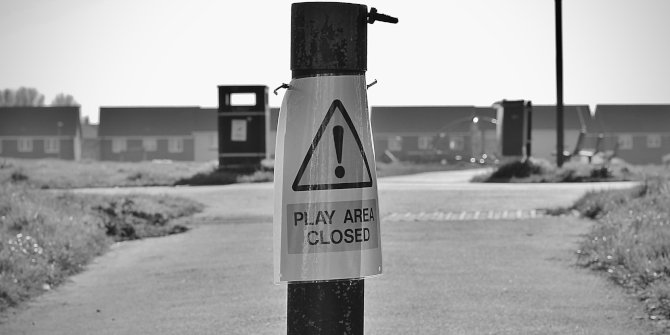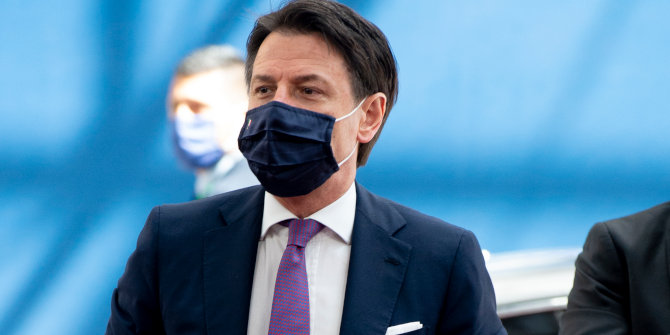In recent years, western democracies have experienced a damaging erosion of faith in scientific expertise. While online conspiracy theories and the alternative facts promoted by charismatic demagogues are partly responsible, some blame attaches to the naïve way in which governments apply scientific data to policy questions, writes Richard Bronk. Science can neither substitute for political choices between competing goals nor replace the need for nuanced judgment of the multifaceted nature of specific problems.
The daily press conferences from Downing Street since March 2020 underline the prominence given to epidemiologists, behavioural scientists and the medical profession in driving policy reaction to the Covid-19 crisis. This may be evidence of a welcome return of scientific expertise to the heart of government after a period when much of the population and elements of the government had, in the words of Michael Gove, ‘had enough of experts.’ But, despite the obvious glories of vaccine research, there is a danger that continual reference by elected governments to scientific modelling to justify contentious policy choices may further undermine scientific expertise and evidence-based policy in the eyes of the electorate.
Popular distrust of social-science expertise has been growing for some time. Economics, in particular, suffered a near-fatal blow to its credibility in the court of public opinion after the 2008 financial crisis, thanks in part to the widespread misuse of economic models to make predictions of unwarranted precision as a result of a basic confusion between calculable risks and radical uncertainty. Distrust was intensified by the tendency for policymakers to justify controversial decisions by delegating them to the outputs of ‘black box’ (cost-benefit, risk-measurement or macroeconomic) models promising to solve the equations of life.
Faith in the medical and natural sciences has generally remained stronger. But the persistence of climate-change denial and large pockets of Covid-19 scepticism suggest that, if natural scientists get blamed for government policies that are unpopular with sections of the electorate, their findings are also likely to become increasingly politicised. This is particularly true if governments hide key value choices and distributional decisions behind the need to react to scientific findings, or if scientists allow themselves to become proselytisers for particular political values or goals. Much damage is done to the independent and non-partisan status of science by illegitimately conflating value choices with empirical analysis.
One unhelpful myth promoted by many economists and other social scientists under the philosophical influence of utilitarianism is that all values can be rendered commensurable in a single unit of account, so that there is always one right answer as to the most rational trade-off between them. This feeds into a technocratic view that analysis and data (such as ‘willingness to pay’ for non-market goods) can on their own provide the correct solution to policy questions – often with the help of state-of-the-art algorithms.
By contrast, voters intuitively understand that the trade-offs between different values or goals – such as medical health and economic growth, economic efficiency and equality, or freedom and security – are highly contested. They want to see the different possible value weightings for each goal relative to others articulated by their politicians and debated since there is no one rational answer. Indeed, the choice of trade-offs made will define the very identity of the body politic. This makes it dangerous for governments to claim that any particular decision, such as closing schools or parts of the economy to reduce Covid-19 transmission, is driven purely by the science rather than by a political choice – in this case to privilege the health service over economic growth and the lives of highly at-risk (mostly elderly) groups over the life-chances of younger generations.
Science has an important role in informing voters and politicians about the practical implications of choosing any particular trade-offs between conflicting goals, and it may at times show analytically that some apparent trade-offs between goals are illusory. But ultimately science cannot determine what is the right value choice to make. Such choices are the stuff of politics and the responsibility of political leaders accountable to the electorate. They should never simply be buried in the assumptions of technocratic models and algorithms.

Professor Jonathan Van Tam, Deputy Chief Medical Officer for England, at a media briefing in November 2020, Credit: Pippa Fowles / No 10 Downing Street (CC BY-NC-ND 2.0)
Confusion between value choices and analytical findings is one threat to the legitimacy of science as a key support for policy. Another is the naïve empiricism of many policymakers when they talk of ‘data-driven policies’ and promote ‘big data’ as the solution to our dilemmas, as if data are some entirely objective touchstone. In practice, scientists never have direct access to underlying reality. Rather, their way of seeing the world is mediated by the particular languages, conceptual grids and scientific instruments they use. The data they analyse – and the facts upon which governments base their assumptions – are partly constructed by the theories and concepts scientists internalise and by the data collection methods used. In this sense, while data can help stress-test policy ideas, they are never entirely neutral or incontrovertible readings of reality. Data need to be evaluated in the light of alternative scientific frames and their pertinence carefully judged.
All scientific theories (and related data collection methods) are selective and focus only on certain aspects of multi-faceted reality. Indeed, the main value of most scientific methods is to abstract from complexity and contingent complications and isolate certain systematic tendencies in the natural or social world: conclusions are presented with the caveat that ‘other aspects’ or factors are assumed to ‘remain equal’ (ceteris paribus) and can therefore be safely ignored. This means that whenever scientific findings are applied to particular policy problems, the first challenge is to assess whether the ceteris paribus clause in the relevant model remains a safe assumption. And for this the policymaker needs to assess the potential relevance of a range of scientific perspectives that may illuminate other – often incommensurable – aspects of the problem at hand.
The challenges with data-driven policy are greater still when dealing with the data needed to model social behaviour. For a start, social scientists are seeking to explain a pre-interpreted world – that is, they have to take account of the context-specific interpretations or constructions of reality that are actually motivating people’s decisions. This was one of the reasons that Friedrich Hayek criticised the use of aggregate statistics by economists and socialist planners: as he put it, the data that matter for explaining economic behaviour are the hard-to-collate subjective assessments, opinions and tacit knowledge of local actors – ‘the things known to the persons whose behaviour we try to explain.’ Similar reasoning accounts for some of the emphasis placed on focus groups in helping design policy. It also shines a light on the Bank of England’s increasing use (noted by David Tuckett et al) of regional agencies and citizen reference panels to glean the narratives and stories shaping different actors’ interpretations of current events and prospects. Such qualitative data can help the Bank decipher new trends in economic behaviour.
In policy and business, much of the faith in ‘big data’ is predicated on the assumption that patterns in past data are a good predictor of the future behaviour of economic actors and the socio-economic system as a whole. But, as Jens Beckert and I argue, this assumption ignores the extent to which the innovation and constant novelty endemic in late capitalist systems introduces a basic indeterminacy that ensures that the future is rarely a statistical shadow of the past. It follows that the focus of economics should be on providing models that can act as diagnostic tools for spotting new patterns in real-time data rather than on trawling huge existing data sets in the hope of being able to extrapolate the future from patterns in the past.
More broadly, all scientific results are provisional – and should be open to audit by other scientists – and none capture more than a subset of reality. When dealing with real-world problems, this means that following the science must involve treating its findings as provisional and partial guideposts, while making careful judgments about the relevance of specialist models in elucidating any particular problem. Furthermore, when coping with multi-faceted issues – involving, for example, economic, social, psychological and physiological factors – the policymaker must work out the feasibility of synthesising the findings of the different relevant scientific disciplines to form a rounded picture of the contingent particular.
Such a ‘holistic’ assessment may be loosely based on science but involves consideration of a range of factors beyond the scope of any individual science. In other words, the art of integrating science into governmental decision-making involves reversing the abstraction from the complex interaction of different factors that any science must engage in and using the findings of heterogeneous scientific methods to illuminate the messy particular.
John Neville Keynes made a similar point more than a century ago, when he argued that the findings of abstract economics are ‘conditional’ and must only be applied to make practical recommendations after careful consideration of the particularities of real-world problems and relevant non-economic factors and ethical questions. Such applied economics was, he stressed, an ‘art’ not a science – a view recently revived by David Colander.
In the opening chapters of The Sense of Reality, Isaiah Berlin also concluded that the ‘art of governing’ is something quite different from scientific knowledge. It involves the insight and judgment required to understand the interplay between the different relevant aspects and levels of reality captured by different sciences. Like science, governing requires epistemological humility, constant improvisation and trial and error. But unlike science, it can never afford to abstract from the contingent particularity of life. As Berlin put it, good government involves a special sensitivity to the small changes that may in fact be critical to outcomes and an appreciation of the ‘dark mass of factors whose general drift we perceive but whose precise interrelations we cannot formulate.’ The art of good governance is to avoid taking scientific illumination of a single aspect of reality as the whole truth. It involves combining the generalisable and testable findings of science with an understanding of ‘a particular situation in its full uniqueness’.
This is not to underestimate the political challenge of such a nuanced use of science. Voters may respond better initially to politicians using simple messages to express unwarranted certainty than to those who acknowledge that the science on which their decisions are based is partial and provisional. As Berlin noted laconically in a letter to Kay Graham quoted by Aurelian Craiutu, ‘nuances are merely a nuisance’; they are difficult to articulate, and they are ‘treated as confusion or evasion’.
Here central bankers can perhaps show politicians the way. In recent years, they have developed the art of fashioning nuanced narratives based on the output of scientific models supplemented with qualitative assessment of broader factors. Crucially, these narratives guide our expectations while being couched in provisional terms that ensure their credibility is not shredded when reality springs a surprise.
Note: This article gives the views of the author, not the position of EUROPP – European Politics and Policy or the London School of Economics. Featured image credit: Pippa Fowles / No 10 Downing Street (CC BY-NC-ND 2.0)





